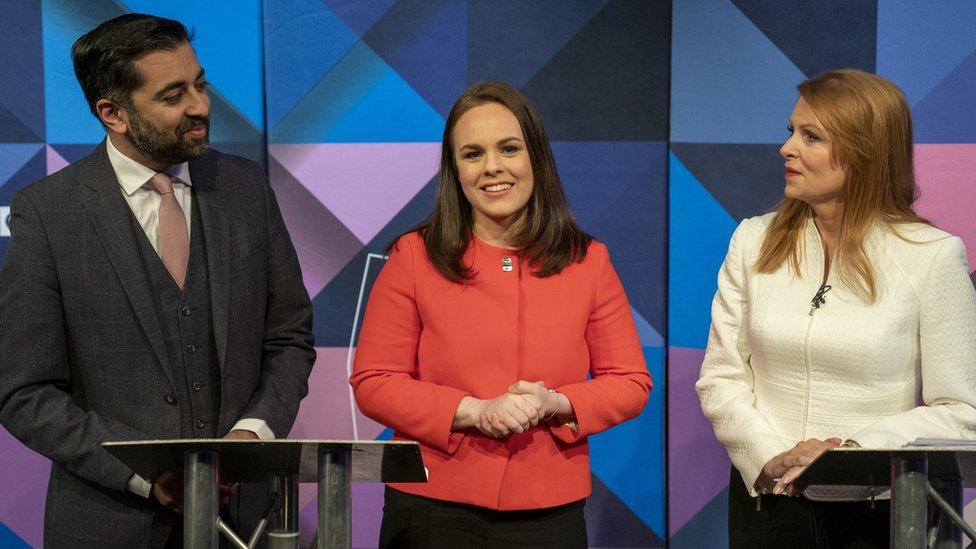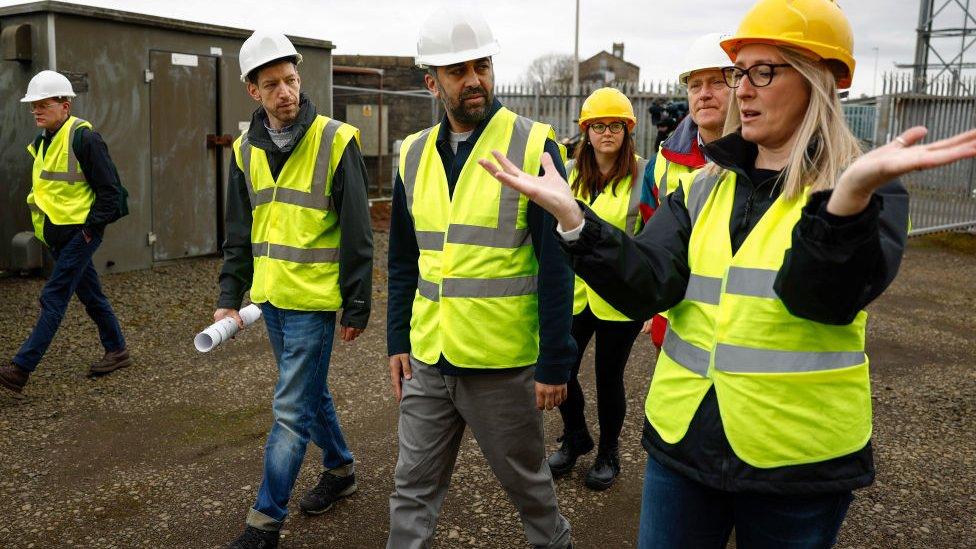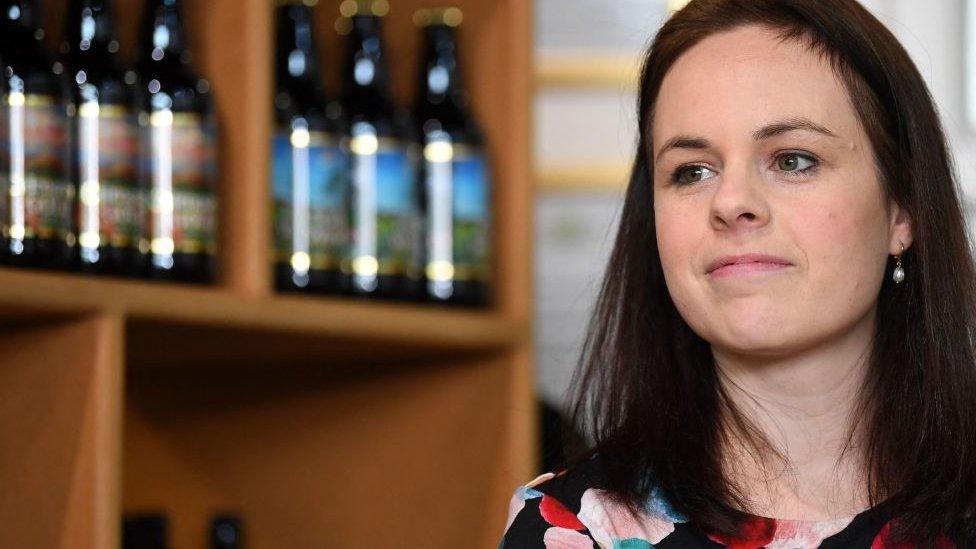SNP leadership: Taking care of business
- Published

Humza Yousaf, Kate Forbes and Ash Regan are running to succeed Nicola Sturgeon as SNP leader and first minister
The economy is probably the area in which SNP leadership candidates are heading in the most divergent directions, starting with the priority they give to growth or to wellbeing.
Business has been calling for a re-set of a relationship with St Andrew's House which they found too distant. There's a long list of concerns.
The new leader seems likely to reject much of the economic plan for independence built up under Nicola Sturgeon. Finding a new plan will not be easy.
The SNP leadership campaign has been bruising. You could argue it is despite the small differences between candidates, or the reverse - that it is because there is so little difference in the positions they have taken.
Sigmund Freud identified it as the "narcissism of small differences", in which people whose positions are similar are more given to engage in personal attacks.
But one area where we could expect the most distinct difference between the three first ministers on offer is on the economy, and their approach to business.
In debate, they pledged their allegiance to the cause of Scotland's small businesses. Among the SNP electorate, there are significant numbers who run such enterprises.
It takes digging a little deeper to see where the differences are likely.
Asked in the BBC debate about the cost to business of the Deposit Return Scheme on drink containers, Humza Yousaf turned the heat on to big business. If that's his instinct under pressure, big business has been warned.

Humza Youasf visited the proposed site of the Eden Project in Dundee while on the campaign trail
Asked about economic growth, the health secretary quickly shifts his response to the concept of the wellbeing economy. This fits with his image as the continuity candidate. Ash Regan is similarly enthusiastic about wellbeing.
Nicola Sturgeon championed the shift to wellbeing as the economic focus of her administration, joining with other countries interested in the concept. However, it remained a work in the early stages of progress - more rhetoric than apparent reality.
Kate Forbes, as finance and economy secretary, responds with her credentials in having worked on the wellbeing agenda.
'Turbo-charge'
But as leader, she's been making clear that this would be one of the clearest breaks with the Sturgeon years. That would be similar to the last transition. The move away from the focus on conventional economic growth was Nicola Sturgeon's first signal of breaking away from Alex Salmond's leadership agenda.
I put several questions about business and the economy to the candidates. Kate Forbes' response was striking for the repetition of the word "intentional". It's almost as if she thinks the Sturgeon regime's approach to the economy was unintentional - as if it lacked focus or direction.
If that's what is meant, then that is also what one hears most from business - that although Nicola Sturgeon was not hostile to the interests of Scottish business, her energies were elsewhere, it was not a priority, and there was a lack of focus on the economy.
Asked about the risk of Scotland being seen as a high tax economy, Kate Forbes responded with concern about Scotland's depopulation and the need to be more "intentional" about attracting workers into Scotland.
She wants to take a more intentional approach to the energy sector, focussing on such industries because that is where she hopes to "turbo-charge" Scotland's disappointing growth rate in recent years.
Asked how candidates would differ from Nicola Sturgeon's economic policy and approach to business, again, the intention is to be intentional about working with business.
Skills and talent
There's quite a long agenda to work through. In this campaign, the Deposit and Return Scheme has taken on a symbolic role for the private sector as it faces a growing range of more or less costly regulatory changes. A series of ideas for severe constraints on the marketing of alcohol has been there too.
To that, add big business concerns about the extra business rates bill for big retail. The bricks and mortar bit of the retail sector is particularly keen to reform business rates.
There are plans, though postponed by Covid, for intervening in the market for selling food that's high in salt, sugar and fat.

Kate Forbes is concerned about depopulation in Scotland and wants to attract more workers
The property sector faces a rent freeze and and a sharp jolt to the tax and rules for renting out property. Salmon farmers are among those challenging plans to remove human activity from an estimated 10% of Scotland's coastal waters.
So various sectors of the economy are very intentional about engaging with the next first minister.
They have had asks. The Scottish Chamber of Commerce wants to hear that economic growth will be top priority, that regulations will be stalled or stopped and that business rates will be reformed.
It's chief executive, Liz Cameron, talks of "serious challenges in every sector of the economy: businesses can't source and find the skills and talent they need to deliver and grow. Upfront costs are mounting up.
"New regulations are eroding our ability to stay in business keeping the staff we have. Transport and digital infrastructure is lagging comparative nations, and business confidence needs to be restored if we are to invest for the future.
Addressing the next first minister, she added: "We need you - backed by a Cabinet with business expertise and experience - to work with us to remove anti-growth policies and build a globally competitive economy."
'Growth matters'
CBI Scotland, also an employer organisation, last week issued its annual review of productivity, reflecting poor performance, some short-term improvements, but long term concerns - not least about the number of Scots not working due to long-term illness.
It wants to see that addressed, alongside better use of Scotland's universities and colleges to make the link from skills to improved economic performance.
Tracy Black, the CBI's director in Scotland, said: "The new first minister has an opportunity to re-focus the government's energies on delivering economic growth, bolstering productivity and building a greener, fairer, more economically inclusive society.
"Growth matters. It's the bedrock of what delivers life opportunities for people - and supports the government to deliver on their priorities."
Reform Scotland, a think tank which takes a largely business-friendly approach to its thinking, pitched in with the advice that a change of leadership should bring a change of approach.
Its director, Chris Deerin, observes: "A continued complaint during Nicola Sturgeon's tenure has been of a poor relationship with the sector. The next first minister must urgently re-set this relationship. They need to listen to, and work with, the business community."
The think tank goes on to call for changes to the way Scottish education is governed, and for net zero ambitions to have more detail attached, not least in reducing the demand for energy for heating.
An economic plan?
Of course, the leadership election has featured much discussion of how to get to independence, both in terms of the constitution and in persuading Scots to support it. With the electorate made up of SNP members, that should be no surprise.
And one of the more significant messages about this, from all three candidates, is a repudiation of the economic case that the party backed less than four years ago.
The Sustainable Growth Commission (SGC) was set up by Nicola Sturgeon as an SNP vehicle for developing the economic plan for independence, to replace the one at the 2014 referendum, which had proved unpersuasive to sceptical voters.

Ash Regan is enthusiastic about a wellbeing economy
That plan drew heavily on the figures from GERS, measuring government expenditure and revenue, which were then heavy with oil revenues. GERS has since become a lot less helpful to the cause, and its continued publication may be in doubt.
The SGC policy review was led by former SNP MSP, economist and now banker Andrew Wilson, and produced a report in 2018 with some uncomfortable messages about the transition to independence.
Highest profile was the plan to transition to a Scottish currency, but only after six tests were met, and via several years of using sterling and squeezing public spending until it becomes more closely aligned with Scottish tax revenue.
The Institute for Fiscal Studies said it looked a lot like continued austerity. That was the line of attack taken by the SNP's opponents. Labour said it was a "cuts commission".
Asked during this campaign by the independence-supporting group Business for Scotland what to do with the SGC report, all three candidates said, in various ways, these days are past now, and in the past they must remain.
Humza Yousaf said it was a product of its time and the strategy needs to be "refreshed". Kate Forbes, who sat on the commission as a backbench MSP, now says "the world is a completely different place today", though its backing for more immigration should be retained.
Ash Regan responded the world "has moved on from [its] conclusions, and so should the conversation", with a focus instead on a wellbeing economy.
Among the big shifts has been Brexit, leaving the independence movement to make the case for re-joining the European Union while minimising barriers to trade with the rest of the UK.
And the importance of tackling climate change, while working with Scottish Green MSPs, has put the SNP in the position of choking off the oil and gas resources on which much of the 2014 economic strategy was based.
Without the Growth Commission, there's a significant gap where the SNP has yet to develop a new economic plan for independence. As if the new party leader and first minister didn't have enough to do.
